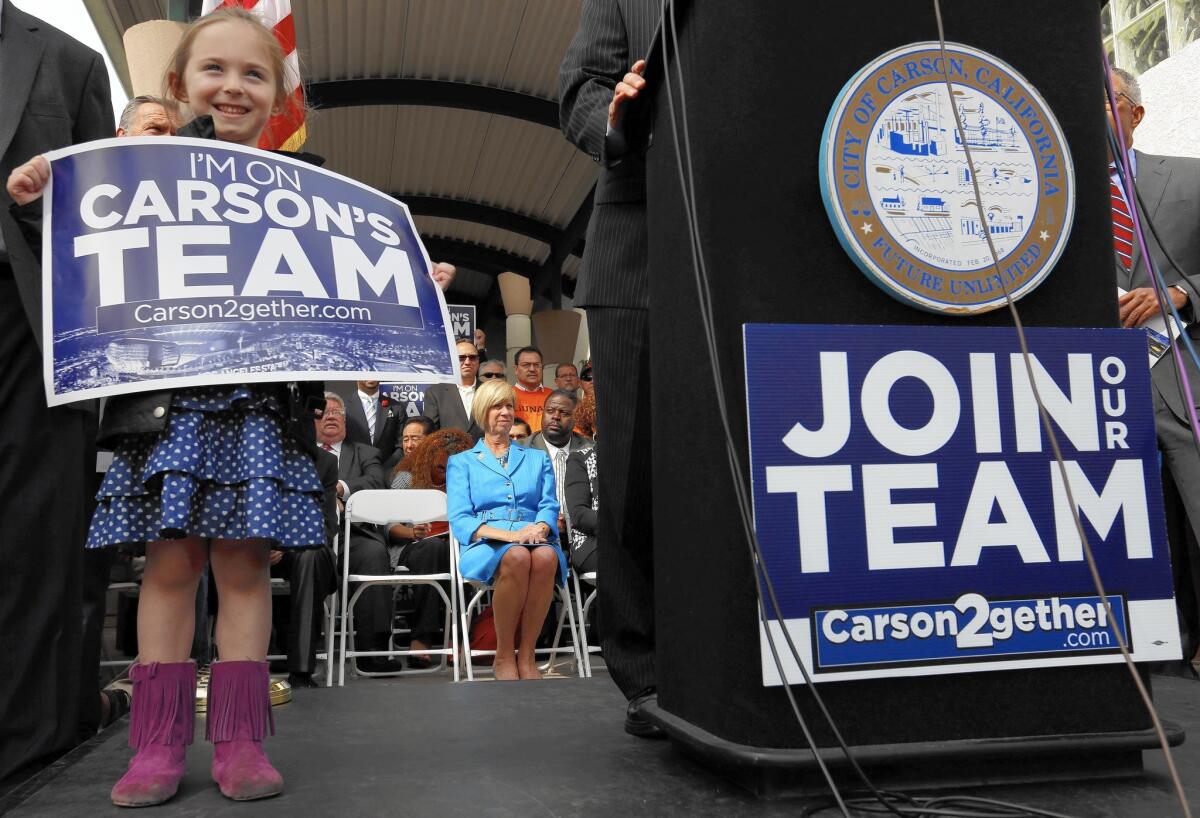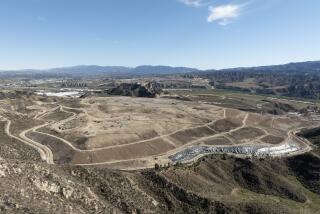State says Carson site ready for construction of NFL stadium

- Share via
For decades, the expanse of empty acreage hugging the 405 Freeway in Carson had been eyed as an ideal location for a shopping mall, homes, a hotel, some combination of those three — or even an NFL stadium.
But there was always one overriding problem: The parcel sat on a gaseous stew of pollutants, the poisoned legacy of its previous life as a landfill.
Now, however, as the San Diego Chargers and Oakland Raiders unveil tentative plans to jointly build a stadium on the site, state regulators say about $50 million in cleanup measures over the years has made the property nearly shovel-ready for construction.
“It is safe,” said Emad Yemut, a supervising engineer for the state Toxic Substances Control Department, which oversees the decontamination effort. “Everything is done.”
Yemut said the site still needs a series of extraction wells to remove methane and other gases from 157 tainted acres, but it could be installed in six months to a year once a final plan for a stadium is approved.
The property, which includes an additional 11 acres outside the landfill, is already equipped with wells that pull out groundwater fouled with industrial solvents, he said. The water is then treated and piped into the sewer system.
Eventually, the parcel would be capped with high-density plastic to prevent garbage-spawned gases from leaking into the air. The cap would be topped with layers of new soil, Yemut said.
“It will be expensive,” he said of the remaining work, estimating the monthly costs of operating just the gas extraction wells at $200,000 to $300,000.
But Yemut and the department’s manager for the Carson project, Daniel Zogaib, said a football venue would be ideal for the property, which runs along the 405’s intersection with Del Amo Boulevard. That’s because the wells and monitoring devices would not have to be pretzeled around numerous buildings, as they would in a housing or retail development.
“The football stadium is much easier,” said Zogaib. “We could start remediating that right now.”
All the costs have been shouldered by the landowners — most recently, Starwood Capital Group —and would be in the future, he said.” The taxpayers don’t pay for these cleanups,” Zogaib said.
A subsidiary of Starwood Capital bought the land for $30 million in 2006, according to real estate data provider CoStar Group. The Chargers and Raiders have obtained control of the property, and Starwood intends to divest its ownership, an NFL source said. Representatives of Starwood did not respond to requests for comment.
Construction of a stadium would take about three years.
The Times reported Thursday that the Chargers and Raiders had come up with a plan — or perhaps a negotiating ploy — to build and share the $1.7-billion, 68,000-seat stadium. The parcel, known as Carson Marketplace, thus again became part of the prospective NFL map in L.A., along with proposed arenas in Inglewood, downtown and City of Industry.
The Chargers and Raiders said they would commit to Carson if they fail to get public subsidies for new stadiums in their home markets. The Carson project would be privately financed, they said.
A group of business and labor leaders formed to push the plan, Carson2gether, launched a ballot initiative drive Friday to get voter approval to build the stadium.
The San Diego-Oakland teaming follows a recent move by St. Louis Rams owner Stan Kroenke to construct an 80,000-seat stadium on the land that used to be Hollywood Park. Also in the mix are billionaire developer Ed Roski’s proposal for a stadium in Industry and AEG’s plan for one next to Staples Center downtown. None of the would-be bids to end L.A.’s 20-year NFL drought is close to a sure thing.
The league itself has considered buying the Carson site at least three times. The land’s tangled history as the old Cal Compact dump — a repository of heavy metals and pesticides — and as a lawsuit magnet had spooked investors for years. Among the previous promoters of its football potential to be ultimately frustrated was Hollywood deal-maker Michael Ovitz.
On Friday, NFL watchers said the cleanup puts Carson back in the game. “It makes it far more likely that the project will go ahead,” said Marc Ganis, a Chicago-based sports consultant. “That’s a major hurdle that’s been removed.”
Yemut said the wells and monitors would remain in place permanently — and be largely invisible to football fans — to ensure there are no health risks. He said the stadium would be anchored on piles plunged deeply into the earth. Proper construction design would further mitigate any hazards from fires or earthquakes, he added.
“This is a complex site, but we’ve been doing this for the past 15 years,” he said.
Times staff writers Roger Vincent, Nathan Fenno and Sam Farmer contributed to this report.
More to Read
Sign up for Essential California
The most important California stories and recommendations in your inbox every morning.
You may occasionally receive promotional content from the Los Angeles Times.











